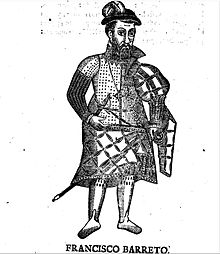Francisco Barreto
| Francisco Barreto | |
|---|---|

Francisco Barreto in Ásia Portuguesa of Manuel de Faria e Sousa
|
|
| Governor of Portuguese India | |
|
In office 1555–1558 |
|
| Monarch |
John III of Portugal Sebastian of Portugal |
| Preceded by | Pedro Mascarenhas |
| Succeeded by | Constantino de Bragança |
| Personal details | |
| Born | 1520 Faro, Kingdom of Portugal |
| Died |
July 9, 1573 (aged 52–53) Portuguese Mozambique |
| Nationality | Portuguese |
| Spouse(s) | Brites de Ataíde |
Francisco Barreto (occasionally Francisco de Barreto, 1520 – July 9, 1573) was a Portuguese soldier and explorer. An officer in Morocco during his early life, Barreto sailed to Portuguese India and was eventually appointed viceroy of the colony. After his return to Lisbon, he was tasked with an expedition to southeast Africa in search of legendary gold mines. Barreto died in what is now Mozambique, having never reached the mines.
Barreto was born in Faro, Portugal, in 1520, to Rui Barreto and Branca de Vilhena. He received military training in Morocco, and eventually became captain and governor of Azemmour, near Casablanca.
In 1547 Barreto arrived in Portuguese India. He took up the position of viceroy in Goa, headquarters of the colony, in June 1555, following the death of Pedro Mascarenhas. On the occasion of his investiture, a play by Luís de Camões, Auto de Filodemo, was put on. Barreto later ordered Camões exiled to Macau (also a Portuguese colony) for his satirical Disparates da Índia, which criticized Portuguese life in India.
During his tenure as viceroy, the intended Catholic Patriarch for Ethiopia arrived, accompanied by an embassy led by Fernando de Sousa de Castello Branco, on 15 March 1556. Because he had more accurate information on matters in that country, Barreto held back most of this party, although allowing Bishop André de Oviedo to continue with some companions. This small group, carried in four small ships, landed at Arqiqo in March 1557, shortly before the Ottoman Empire occupied that port.
...
Wikipedia
